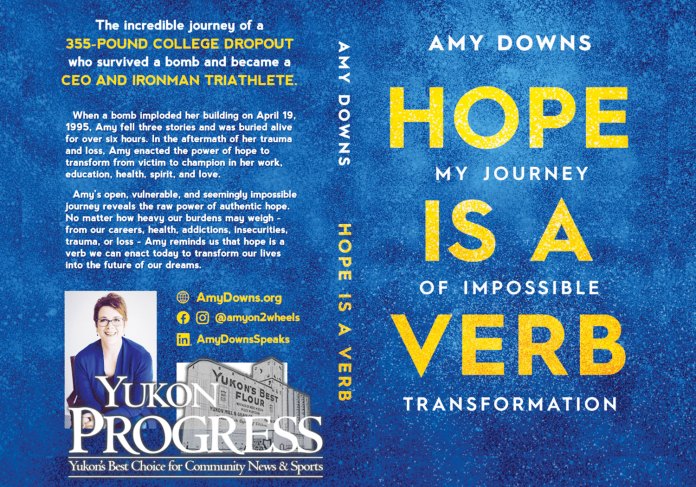

By Conrad Dudderar
Senior Staff Writer
A Yukon woman who survived the Oklahoma City bombing has made the most of her second chance at life.
And her new hope-filled book is inspiring others to follow her lead.

Amy Downs lost more than half her co-workers in the April 1995 bombing of the Murrah Federal Building in downtown Oklahoma City.
Then 28, she fell three stories and was buried alive for more than six hours after the terrorist bomb imploded her building.
After her dramatic rescue, Downs embraced that second chance by transforming herself over the past 25 years.
Downs went from a teller to becoming president/CEO of Allegiance Credit Union, which has grown by 400% after the domestic terrorist attack. A Yukon resident for the past 20 years, she has been recognized by The Journal Record as a “Most Admired CEO.”
Downs returned to college and earned her degree. She lost 200 pounds and became an Ironman Triathlete. She also has become a dynamic, sought-after speaker.
“Sometimes we all need a wake-up call,” Downs said. “Mine was the bombing.”
Through her experience and subsequent transformation, she is helping others live a purposeful life and achieve their dreams.
Downs’ latest achievement is the publication of “Hope Is a Verb: My Journey of Impossible Transformation.”
The book tells the story of how – in the aftermath of her trauma and loss – Downs enacted the power of hope to transform from victim to champion in her work, education, health, spirit, and love.
“Hope Is a Verb” was released around the time the COVID-19 pandemic crippled the nation.
Downs compared how Oklahoma stood strong in the aftermath of the bombing to the current health crisis and its impact on the state. She described these as “unprecedented” events that forced people to adjust to a “new normal.”
FROM BOMBING TO PANDEMIC
Downs shared her memories of that fateful morning in April 1995 when Oklahoma changed forever. What had been a beautiful spring day became dark and cold in an instant.
Downs was sitting at her desk inside the third-floor credit union getting ready to start the workday when mass murderer Timothy McVeigh detonated a Ryder Truck bomb in front of the Murrah Building.
Thinking an airplane had dropped a bomb on the city, Downs recalled that “everything went black” as she heard screaming and cracking.
It was chaos. Downs fell three floors and was instantly buried under several feet of rubble. She couldn’t see anything, couldn’t move and struggled to get air. The smell was unbearable.
It was 45 minutes before she heard voices of rescue workers, but they couldn’t reach her initially and had to retreat. Downs was waiting for another bomb to go off and prepared to say her goodbyes.
Downs shared some of the same thoughts and feelings after COVID hit and people were forced to shelter at home; it felt as if a bomb “hit the world” and nobody could go anywhere.
As she was trapped under rubble 25 years ago, Downs wondered if she had led a wasted life. She weighed 355 pounds and her only hobbies were eating and watching TV.
“If I just had a second chance,” she told herself as she prayed for a rescue.
Downs had never really “lived” her life.


She made a bargain to change for the better and make a positive difference if she survived the catastrophe.
It was a struggle to escape.
Firefighters risked their lives to free Downs. Another 168 occupants of the Murrah Building weren’t so lucky.
As Downs looked around and saw the devastation, she thought, “This can’t be real.”
THE POWER OF HOPE
Downs spent eight days in the hospital. But 18 of her 33 co-workers (“my family”) – including her best friend – were gone.
“It was such a dark time,” said Downs, who sobbed for the lives lost.
The OKC bombing survivor recalled how Oklahomans drove around with their headlights turned on as a symbol of hope, love and support for all victims.
Downs had been on a dark road, and things seemed hopeless.
It was hope that changed things for her, and now she’s written a book about her experiences.
“Hope is simply having a goal, having a pathway toward that goal and the willpower to get to it,” the author said.
The Yukon woman described her life’s “crazy transformation” over the past quarter century.
“It didn’t happen overnight, but it took small steps at a time,” she said.
Downs talked briefly about how the COVID pandemic has changed her business, with Allegiance becoming a “virtual credit union” to better serve customers.
“Who do you want to be?” she asked. “Who do you want to serve?”
Downs also strongly encouraged people to write down their goals, saying they will be 42% more likely to achieve them if they do.
As Oklahoma recovers from the pandemic – just as it did after the OKC bombing – Downs called on citizens to embrace hope in their lives.
“We are Oklahomans,” she said. “We pull ourselves up with our bootstraps.
“We got this.”
Learn more about the Yukon author and speaker at http://www.amydowns.org





